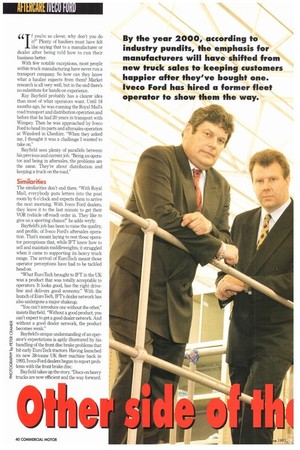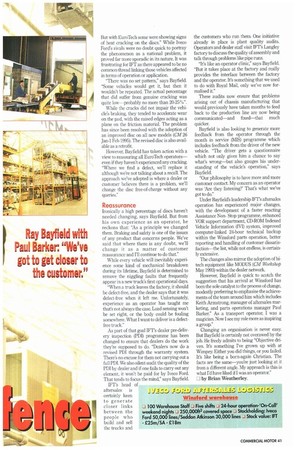gg f you're so clever, why don't you do
Page 42

Page 43

If you've noticed an error in this article please click here to report it so we can fix it.
/ it?" Plenty of hauliers must have felt like saying that to a manufacturer or dealer after being told how to run their business better.
With few notable exceptions, most people within truck manufacturing have never run a transport company. So how can they know what a haulier expects from them? Market research is all very well, but in the end there's no substitute for hands-on experience.
Ray Bayfield probably has a clearer idea than most of what operators want. Until 18 months ago, he was running the Royal Mail's road transport and distribution operation and before that he had 20 years in transport with Wimpey. Then he was approached by Iveco Ford to head its parts and aftersales operation at Winsford in Cheshire. "When they asked me, I thought it was a challenge I wanted to take on."
Bayfield sees plenty of parallels between his previous and current job. "Being an operator and being in aftersales, the problems are the same. They're about distribution and keeping a truck on the road."
Similarities
The similarities don't end there. "With Royal Mail, everybody puts letters into the post room by 6 o'clock and expects them to arrive the next morning. With Iveco Ford dealers, they leave it to the last minute to get their VOR (vehicle off-road) order in. They like to give us a sporting chance!" he adds wryly.
Bayfield's job has been to raise the quality, and profile, of Iveco Ford's aftersales operation. That's meant laying to rest those operator perceptions that, while IF'!' knew how to sell and maintain middleweights, it struggled when it came to supporting its heavy truck range. The arrival of EuroTech meant those operator perceptions have had to be tackled head on.
"What EuroTech brought to IFT in the UK was a product that was totally acceptable to operators. It looks good, has the right driveline and delivers good economy." With the launch of EuroTech, IFT's dealer network has also undergone a major shakeup.
"You can't introduce one without the other," insists Bayfield. "Without a good product, you can't expect to get a good dealer network And without a good dealer network, the product becomes weak."
Bayfield's unique understanding of an operator's expectations is aptly illustrated by his handling of the front disc brake problems that hit early EuroTech tractors. Having launched its new 38-tonne UK fleet machine back in 1993, Iveco Ford dealers began to report problems with the front brake disc.
Bayfield takes up the story "Discs on heavy trucks are now efficient and the way forward. But with EuroTech some were showing signs of heat cracking on the discs." While Iveco Ford's rivals were no doubt quick to portray the phenomenon as a national problem, it proved far more sporadic in its nature. It was frustrating for IFT as there appeared to be no common thread linking those vehicles affected in terms of operation or application.
"There was no set pattern," says Hayfield. "Some vehicles would get it, but then it wouldn't be repeated. The actual percentage that did suffer from genuine cracking was quite low--probably no more than 20-25%".
While the cracks did not impair the vehicle's braking, they tended to accelerate wear on the pad, with the raised edges acting as a plane on the friction material. The problem has since been resolved with the adoption of an improved disc on all new models (CM 26 Jan-1 Feb 1995). The revised disc is also available as a retrofit.
However, Bayfield has taken action with a view to reassuring all EuroTech operators— even if they haven't experienced any cracking. "Where we find a defect, we'll replace it although we're not talking about a recall. The approach we've adopted is where a dealer or customer believes there is a problem, we'll change the disc free-of-charge without any queries."
Reassurance
Ironically a high percentage of discs haven't needed changing, says Bayfield. But from his own experience as an operator, he reckons that: "As a principle we changed them. Braking and safety is one of the issues of any product that concerns people. We've said that where there is any doubt, we'll change it as a matter of customer reaksurance and I'll continue to do that."
While every vehicle will inevitably experience some kind of mechanical breakdown during its lifetime, Bayfield is determined to remove the niggling faults that frequently appear in a new truck's first operational days.
"When a truck leaves the factory, it should be defect-free, and the dealer says that it was defect-free when it left me. Unfortunately, experience as an operator has taught me that's not always the case. Load sensing won't be set right, or the body could be fouling somewhere. What I want to deliver is a defectfree truck."
As part of that goal IFT's dealer pre-delivery inspection (PDI) programme has been changed to ensure that dealers do the work they're supposed to do. "Dealers now do a revised PDI through the warranty system. There's no excuse for them not carrying out a full PDI. We also silent-audit the quality of the PDI by dealer and if one fails to carry out any element, it won't be paid for by Iveco Ford. That tends to focus the mind," says Bayfield.
IFT's head of aftersales is certainly keen to generate closer links between the people who build and sell the trucks and the customers who run them. One initiative already in place is plant quality audits. Operators and dealer staff visit IFT's Langley factory to discuss the quality of assembly and talk through problems like pipe runs, "It's like an operator clinic," says Bayfield. "But it takes place at the factory and really provides the interface between the factory and the operator. It's something that we used to do with Royal Mail, only we've now formalised it."
These audits now ensure that problems arising out of chassis manufacturing that would previously have taken months to feed back to the production line are now being communicated—and fixed—that much quicker.
Bayfield is also looking to generate more feedback from the operator through the month in service (MIS) programme which includes feedback from the driver of the new vehicle. "The driver gets a questionnaire which not only gives him a chance to say what's wrong—but also gauges his understanding of the vehicle's operation," says Bayfield.
'Our philosophy is to have more and more customer contact. My concern as an operator was 'Are they listening?' That's what we've got to do."
Under Hayfield's leadership IFT's aftersales operation has experienced major changes, with the development of a faster reacting Assistance NonStop programme, enhanced VOR support department, CD-ROM Indexed Vehicle Information (IW) system, improved computer-linked 24-hour technical backup within the Winsford pat-Ls operation, better reporting and handling of customer dissatisfaction—the list, while not endless, is certainly extensive.
The changes also mirror the adoption of hitech equipment like MODUS (CM Workshop May 1993) within the dealer network.
However, Hayfield is quick to scotch the suggestion that his arrival at Winsford has been the sole catalyst to the process of change, modestly preferring to emphasise the achievements of the team around him which includes Keith Armstrong, manager of aftersales marketing, and parts operations manager Paul Barker." As a transport operator, I was a magician. Now I see my role more as inspiring a group."
Changing an organisation is never easy. But Hayfield is certainly not overawed by the job. He freely admits to being "Objective driven. It's something I've grown up with at Wimpey. Either you did things, or you failed. It's like being a born-again Christian. The facts are the same—you're just looking at it from a different angle. My approach is this is what I'd have liked if I was an operator."
1 by Brian Weatherley.
























































































































